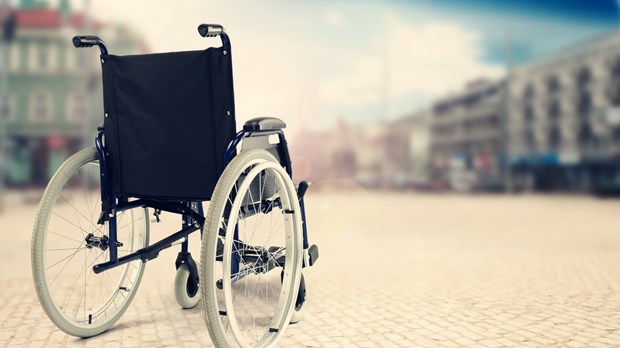
I walk with a pronounced limp. I have limited use of my arms. I tire easily. But those aren’t the worst of my problems.
The real struggle? I don’t like asking for help.
Asking for help makes me feel weak. Vulnerable. Needy.
My Journey of Independence
I have always wanted to be self-sufficient. And I worked hard at it. I contracted polio as an infant in India and was left a quadriplegic after my high fever subsided. But after several surgeries I was able to walk and, after 21 operations, became fairly independent. In high school, I knew my limitations and organized my life around them.
Going away to college was another major hurdle, and I wondered how I would survive. To everyone’s surprise, I learned to adapt, and by the time I graduated, I had figured out how to manage on my own. After a few years I got married and then had children, grateful the hardest part of my disability seemed behind me.
I was a typical stay-at-home mom, busy caring for my children. I also enjoyed painting, scrapbooking, and making jewelry—basically anything I could create with my hands. I started selling my jewelry at a local store, but soon afterward I developed an agonizing pain in my right arm. I went to the doctor and, after several months, was diagnosed with post-polio syndrome. My arms would never recover. The doctors said I needed to reduce the strain on them. Immediately. Radically. Permanently.
I was told post-polio was a degenerative condition that results in escalating weakness and pain. My energy was like a fixed sum of money in a bank—I could make withdrawals but not deposits. So every time I used that arm, I was losing future strength. From now on, my energy could not be spent on short-term hobbies when I needed to focus on being able to feed myself long-term. Now my arms could only be used for the bare essentials.
This diagnosis blindsided me, turning my comfortable life upside down. I was a 37-year-old wife and mother with two young children to raise. It was unthinkable I could one day, maybe soon, be in a wheelchair full time, unable to care for myself. How could God do this to me? I wept. How could I handle these new obstacles?
Devastating Losses
I stopped scrapbooking and boxed up my room full of supplies. I gave up painting and making jewelry and canceled my subscriptions to cooking magazines. I made simple meals and entertained less. While all of these losses were difficult, losing my independence was the most excruciating. I constantly had to ask for help doing everyday tasks—things I longed to do for myself.
For me, the loss of self-sufficiency felt humiliating. I hated being dependent on other people. But I had no choice: I needed help driving long distances, making dinner, and occasionally even getting dressed.
I had long defined myself as a helper, and I struggled with this role reversal. I didn’t want to have needs; I wanted to be needed. I didn’t want to be a burden; I wanted to lift others’ burdens. I didn’t want to be dependent; I wanted to be self-sufficient.
Every day I fought asking for help. I desperately wanted to do things for myself. And I cried constantly. It seemed unfair that ordinarily easy, everyday tasks were now exhausting for me.
At first I was angry. Then I grew depressed. I didn’t know if I could accept this new life. I pulled away from God. I questioned his goodness and his love for me and figured he wasn’t going to answer my prayers anyway.
But eventually, I realized I could not face this trial without God. I finally poured out my heart to him and asked him to help me handle my losses well. To show me how joyful dependence could look. To give me grace to deal with whatever I was given.
And God changed everything. Not by changing my circumstances but by lighting a path through the darkness. He taught me how to pray, how to ask, and how to receive. He gave me glimpses of his glory. He showed me how he is using my circumstances to change me.
Life in the Trenches: The Daily Battle
It was a constant struggle. And if I’m completely honest, it is still a struggle. I think it always will be.
Part of me will always long for my independence. But in that longing I have learned to lean on God in prayer. I have learned how to offer God my honest lament—my anger and grief poured out unedited. I have learned to tell God what’s hard and admit I dread asking for help. I have learned prayer changes my perspective on my life. Through prayer I am reminded heaven is real, and one day I will have a new body.
Until then, I need the humility to ask for help.
Asking for help is always hard because I’m proud and I’d rather not need anyone. But most people are more than willing to help—they are just waiting to be asked. Sometimes people can’t help, and in those situations I must graciously accept their no without getting discouraged and without giving up. The first person I ask is not always the person God has chosen to help.
Glimpses of Glory
The entire process is humbling, but this dependence on God and on others has grown my faith in incalculable ways. As my body has become weaker, my faith has grown stronger. Second Corinthians 4:16–17 says: “That is why we never give up. Though our bodies are dying, our spirits are being renewed every day. For our present troubles are small and won’t last very long. Yet they produce for us a glory that vastly outweighs them and will last forever!” As this passage points out, though my strength is declining, God is renewing my spirit daily, and one day I will see what he has done with my suffering.
I can show the surpassing worth of Christ when I suffer well, when I joyfully accept circumstances that are less than perfect, when I give up my need to control. Willingly relinquishing my need to have things exactly as I want is an act of worship.
Even when it seems that no one sees or knows, Someone does see and Someone does know. Not one of these sacrifices will be forgotten. One day they will all shine in glory. They will all count.
So when someone helps me cook dinner or straightens up my house and it’s not the way I’d prefer it to be done, or when I can’t style my hair as I’d like and I must settle for a ponytail, I can offer all those things as worship.
My faith and my character are not all that has grown through my losses. My friendships and sense of community have deepened tremendously as well. I have been humbled and amazed at the willingness of others to help, even at great cost to themselves. I see the love of Christ in how he cares for me through the body of Christ. As my physical body is deteriorating, his body has taken over for mine, showering me with love and unexpected kindness. Kindness I would have never known if I hadn’t needed it. Love I would never have experienced if I had refused to ask for help.
says it is more blessed to give than receive. So in asking for help, I am giving others the opportunity to be blessed. They have the privilege of being used by God. And as I depend on him more and more, he is gradually transforming me into the likeness of Christ. That transformation is the greatest blessing of all.
Read more articles that highlight writing by Christian women at ChristianityToday.com/Women
 Read These Next
Read These Next

 The Lure—and Lie—of Self-HelpYou need much more than easy tips for a better life.
The Lure—and Lie—of Self-HelpYou need much more than easy tips for a better life. Ripped Apart By SuicideSix ways to comfort those suffering the grievous loss of a loved one
Ripped Apart By SuicideSix ways to comfort those suffering the grievous loss of a loved one









 Homepage
Homepage
